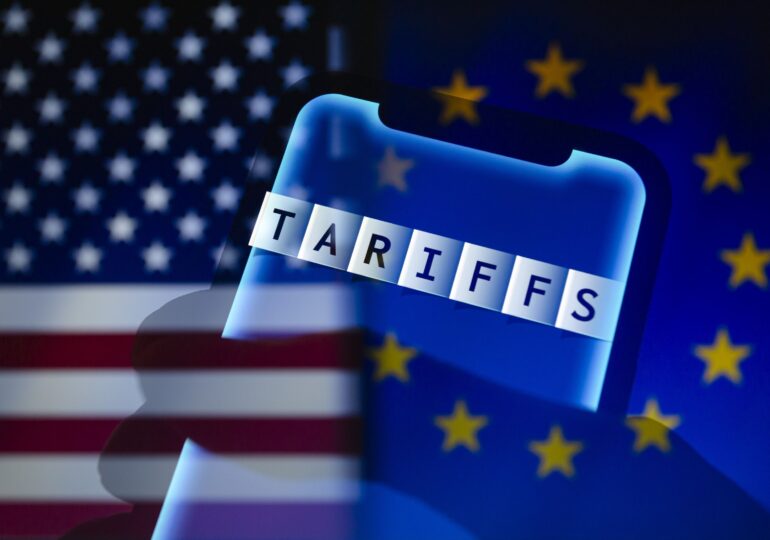German Chancellor Friedrich Merz welcomed on Sunday the trade agreement between the United States and the EU, which includes a 15% tariff on European exports, but the industry of the continent’s leading economy expects significant losses.
Rome also welcomed the agreement, considering it avoids a trade war, but remains cautious, awaiting details. In France, the opposition denounced the agreement reached by Donald Trump and Ursula von der Leyen, AFP reports.
This hard-won agreement allows for "avoiding an unnecessary escalation of transatlantic trade relations," said German Chancellor Friedrich Merz, noting that the United States is Germany's top trading partner.
"We managed to safeguard our fundamental interests, even though I would have liked more facilities in transatlantic trade," he added, expressing relief especially in the case of the automotive industry, "where current tariffs, which stand at 27.5%, will be almost halved, reaching 15%." "Especially in this sector, the rapid reduction of tariffs is of paramount importance," emphasized the leader of the leading European economy.
In addition to the automotive industry, a pillar of the German industry, the chemical and machinery sectors are particularly dependent on exports to the United States.
The conservative Chancellor expressed "full support for the negotiations that will now begin regarding the details of the agreement" before the European Commission.
German Industry Dissatisfied
The German industry foresees "considerable negative repercussions" for this key sector of the German economy, heavily focused on exports. "The lack of an agreement on steel and aluminum exports is an additional blow," BDI emphasizes.
The EU currently faces a 50% tariff on steel exports to the United States, but European Commission President Ursula von der Leyen has assured that a compromise has been reached with Donald Trump. "Between us, tariffs will be reduced, and a quota system will be established," she said. However, the American President has assured that things will remain "as they are."
The German chemical industry considers the 15% tariffs "too high." "When you expect a hurricane, you are glad to get just a storm. A new escalation has been avoided. Nevertheless, the price to pay is high for both parties," reacted the VCI federation in the chemical industry, representing industrial giants such as Bayer or BASF, in a statement.
The German Foreign Trade Federation (BGA) referred to a "painful compromise," with the level of surcharges representing an "existential threat" to many businesses.
One of the country's most influential economists, Clemens Fuest, described the announced agreement as "a humiliation for the EU, reflecting the power imbalance." "Europeans need to wake up, focus more on their economic power, and reduce their military and technological dependence on the United States," he wrote on X.
Italy Remains Cautious
Like Berlin, Rome welcomed the trade agreement on Sunday evening, considering it avoids a trade war, but remains cautious awaiting details. "The agreement between the EU and the United States puts an end to a period of uncertainty and avoids a trade war. We will examine all the details," wrote X Antonio Tajani, the head of Italian diplomacy.
The same tone was adopted by the Prime Minister, Giorgia Meloni, who was visiting Ethiopia for a UN summit on food security. "I believe it is positive that an agreement has been reached, but until I see the details, I cannot draw a better conclusion," she said in Addis Ababa, as reported by the Italian press.
In France, Opposition Denounces the Agreement
The left and right opposition parties in France are on the same page: the agreement announced Sunday evening by Donald Trump and Ursula von der Leyen undermines French sovereignty.
The leader of the far-right, Marine Le Pen, described the agreement as "a political, economic, and moral failure." "The (European) Commission has accepted asymmetric clauses that France, if governed by a patriotic executive, would never have accepted. Gas worth hundreds of billions of euros, as well as weapons, will have to be imported annually from the United States," denounced the de facto leader of Rassemblement National (RN), speaking of a "surrender for the French industry and for French energy and military sovereignty."
The same attitude is true for the far left, where the leader of La France Insoumise, Jean-Luc Mélenchon, believes that "everything has been surrendered to Trump." "Tariffs, mandatory purchases, a tax of 5% of GDP: liberalism, free and undistorted competition, and the other rules of the Lisbon Treaty are a bad joke," he denounced, advocating for "choosing insubordination to the Empire and non-alignment" as "the only possible alternative."
According to the initial elements of this long-awaited trade agreement between Brussels and Washington, the United States will impose a 15% tariff on imported European products, and the EU has promised $750 billion in energy purchases and an additional $600 billion in investments in the United States.

